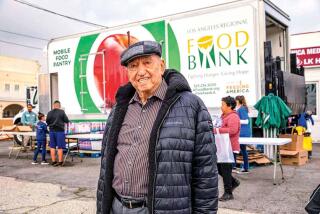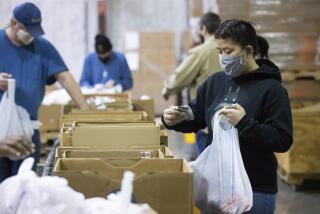VOLUNTEERISM : Youths Found to Outdo Adults in Aiding Needy
- Share via
WASHINGTON — Young Americans, often criticized as self-centered and frivolous, may in fact be more generous than adults in volunteering their time to help the poor, the elderly and others in need.
About 58% of teen-agers said they did volunteer work in 1989, according to a recent survey by the Gallup Organization, compared to 54% of adults. Most started giving their time when they were 13 years old. On average, they undertook 2.6 volunteer assignments a year, spending 3.9 hours each week, with one-fourth of the group giving five or more hours weekly.
A similar study released in October showed that the “twentysomething” generation, another group maligned as apathetic and lazy, also contributes slightly more volunteer hours than Americans 30 years and older.
And officers of philanthropic organizations that depend on volunteers say that both surveys mesh with patterns they are seeing across the country.
“These findings certainly fly in the face of those who say that philanthropy in America is eroding with each generation,” said Brian O’Connell, president of Independent Sector, an umbrella group of philanthropic interests that commissioned the Gallup survey on voluntarism.
Teen-agers contributed more than 1.2 billion voluntary hours of work, according to the study. Most frequently, teen-age endeavors took the form of baby-sitting, assisting the elderly and handicapped and serving as aides or assistants to paid employees in organizations serving the needy.
More significant than the nature of these tasks, however, is the attitude that the younger generation seems to have toward volunteer work.
Virginia Hodgkinson, who was involved in the survey report, called “Volunteering and Giving Among American Teen-agers,” said the fact that future generations are volunteering and see volunteerism as a natural and helpful act is more important than the forms of volunteering.
“Our feeling is that doing some volunteer activity and getting started is most important,” Hodgkinson said, adding that 85% of all teen-agers surveyed said they enjoyed their volunteer experiences and would volunteer again if asked.
Further, the teen-agers surveyed expressed more confidence in health and social service organizations, federated charitable appeals, public higher education and the media than in all other major institutions of society, including government, Congress and organized labor.
Most of them got involved in such activities through their schools and religious organizations. In the last 10 years, many schools have made a concerted effort to encourage students to volunteer, with some including it in their requirements for graduation.
However, O’Connell said that he does not think the schools should require students to participate in community service because he fears that they might “confuse volunteering with requirements.”
More to Read
Sign up for Essential California
The most important California stories and recommendations in your inbox every morning.
You may occasionally receive promotional content from the Los Angeles Times.













